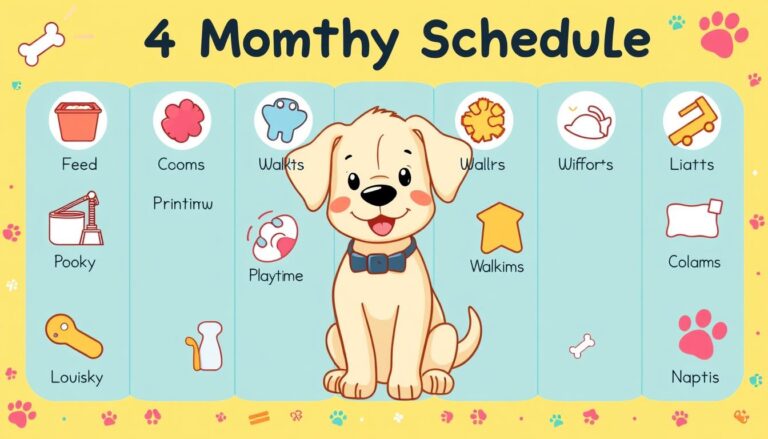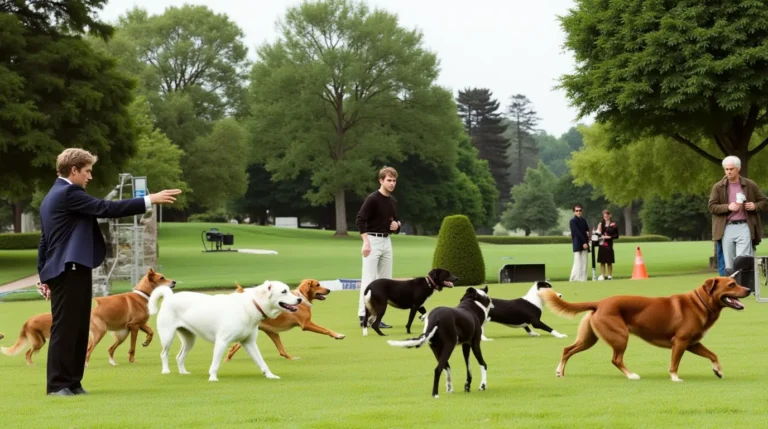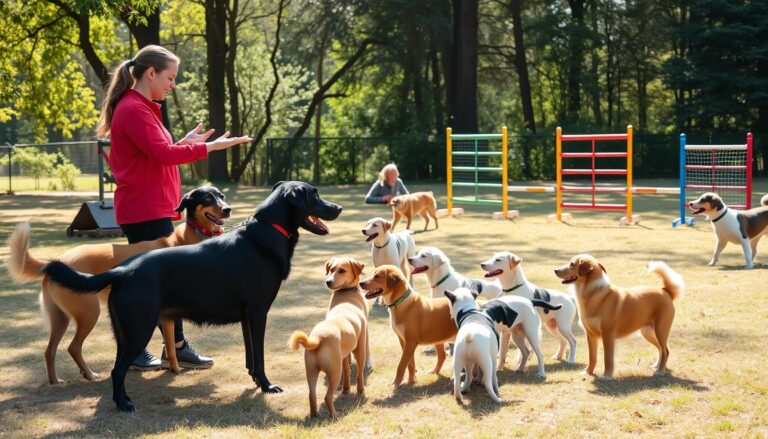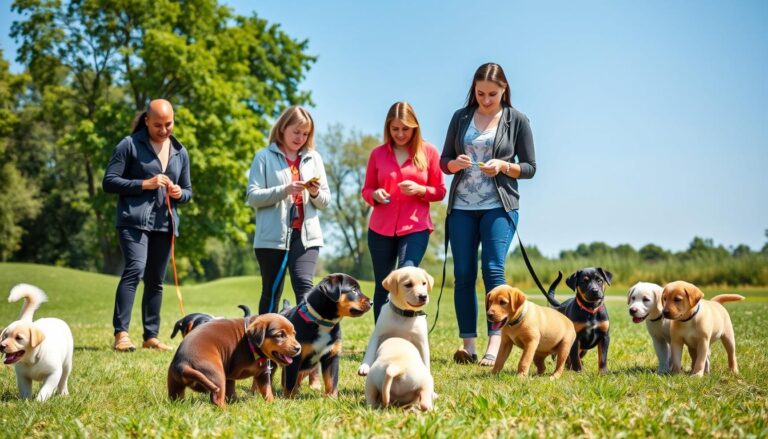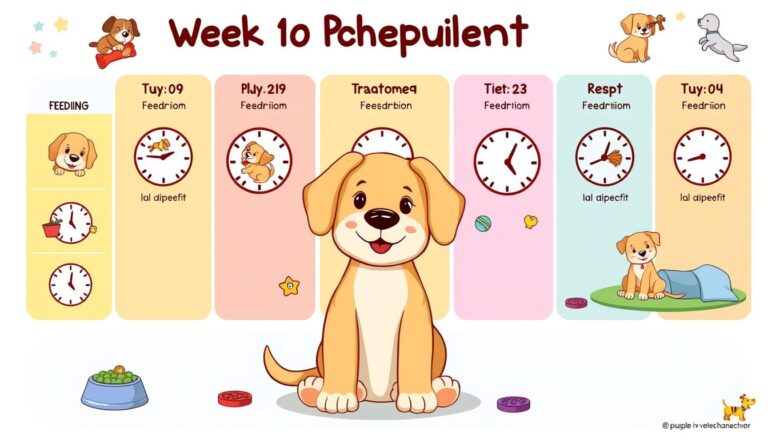Puppy Training Near Me: Expert Tips for Raising a Well Behaved Puppy
Puppy Training Near Me: Expert Tips for Raising a Well Behaved Puppy
Bringing a new puppy into your home is an exciting and joyful experience. Yet, it also brings the challenge of teaching them to behave well. Finding the right puppy training can seem daunting. But, with the right help, you can turn your playful puppy into a well-mannered family member.

This guide will show you why professional puppy training is key. We’ll also talk about the benefits of starting early. You’ll learn how to build a strong bond with your puppy. We’ll help you find the best puppy trainers near you, whether you prefer group classes or private sessions.
- Puppy Training Near Me: Expert Tips for Raising a Well Behaved Puppy
- Understanding the Importance of Professional Puppy Training
- Finding the Best Dog Training Classes Near Me
- Essential Basic Commands for Your Puppy's Development
- Professional Dog Trainers Near Me: What to Look For
- Choosing Between Group and Private Puppy Training Near Me
- Common Puppy Behavior Problems and Solutions
- Creating an Effective Training Schedule at Home
- Understanding Different Training Methods and Approaches
- Conclusion
- FAQ
Understanding the Importance of Professional Puppy Training
Getting professional dog trainers near me for your puppy is crucial. It shapes their early development and behavior. Expert guidance is key for a strong bond with your dog.
Benefits of Early Training Intervention
Puppies soak up new things quickly. Early puppy training near me programs teach them good habits. They learn important commands, control their impulses, and socialize.
Impact on Long-term Behavior Development
Early lessons shape your puppy’s future behavior. Dog trainers near me can spot and fix issues early. This ensures your puppy grows into a well-adjusted, obedient friend.
Building a Strong Human-Canine Bond
Professional puppy training near me also strengthens your bond. Training together builds trust and understanding. This enriches your relationship for years.
“Investing in professional training for your puppy is one of the best gifts you can give them – and yourself. It lays the foundation for a lifetime of happy, healthy companionship.”
Explore dog trainers near me and puppy training near me options. The effort you put in now will benefit your dog in the long run. It will lead to a well-behaved, happy dog that brings joy to your family.
Finding the Best Dog Training Classes Near Me
Finding the right dog training classes near you is key for your puppy’s growth. Whether you want to teach basic commands or tackle specific issues, local services are essential. They help shape your puppy’s behavior and skills.
To find top dog training classes, start by searching online. Use terms like “dog classes near me” and “dog training services near me” to find options. Look for classes that focus on puppies and use positive methods.
- Check the trainers’ credentials and experience. Look for certifications from groups like the Certification Council for Professional Dog Trainers (CPDT) or the International Association of Animal Behavior Consultants (IAABC).
- Consider the class size and structure. Smaller classes are better for puppies, offering more personal attention.
- Choose classes that use positive reinforcement. This builds a strong bond between you and your puppy, unlike punishment-based methods.
After narrowing your choices, contact the training facilities. Ask questions to see which program suits your puppy’s needs and your goals.
| Dog Training Class | Trainer Certification | Class Size | Training Approach |
|---|---|---|---|
| Pawsitive Pups | CPDT-KA | 8-10 puppies | Positive Reinforcement |
| Canine Companions | IAABC Certified | 6-8 puppies | Balanced Training |
| Puppy PlaySchool | CPDT-KA, CBCC-KA | 4-6 puppies | Positive Reinforcement |
By researching and comparing local dog training services near me, you’ll find the best fit for your puppy’s needs.
Essential Basic Commands for Your Puppy’s Development
Puppy training is key for your pet’s happiness and your bond. Three commands are vital: sit, stay, and come. Learning these commands is the first step to a well-trained puppy.
Mastering Sit, Stay, and Come Commands
The sit command is useful for many situations, like saying hello or staying calm at the vet. The stay command teaches patience and control. The come command is crucial for safety, ensuring your puppy comes back when called.
Teaching Leash Manners and Walking Etiquette
Teaching your puppy to walk nicely on a leash is important. They should walk by your side without pulling or jumping. This makes walks fun and keeps them safe.
House Training Fundamentals
House training is a big part of puppy care. Create a routine and reward your puppy for going in the right spot. With time and patience, they’ll learn to tell you when they need to go.
Focus on these key commands and skills to help your puppy grow into a well-behaved friend. Looking into puppy training near me or dog training classes near me can offer great help and support.
Professional Dog Trainers Near Me: What to Look For
Finding the right dog trainers near me or puppy trainers near me is crucial. It’s key for your dog’s growth and for a strong bond with them. A skilled trainer can make a big difference.
Here are important things to look for in a dog trainer or puppy trainer:
- Certifications and Credentials – Choose trainers with recognized certifications like CPDT or IAABC.
- Training Approach – Opt for positive reinforcement methods. Avoid trainers who use punishment.
- Experience and Specialization – Look for trainers with lots of experience and a focus on your needs, like puppy training.
- Client Testimonials – Check reviews and ask for references to see if past clients were happy.
By carefully choosing the right dog trainers near me or puppy trainers near me, your dog will get the best care. This ensures they thrive.
| Certification | Description |
|---|---|
| CPDT (Certified Professional Dog Trainer) | Recognizes trainers who use positive training methods. |
| IAABC (International Association of Animal Behavior Consultants) | Certifies trainers in animal behavior and science-based training. |
“A well-trained dog is a joy to own and a pleasure to be around. Investing in professional dog trainers near me or puppy trainers near me is one of the best things you can do for your canine companion.”
Choosing Between Group and Private Puppy Training Near Me
Choosing between group and private puppy training can be tough. Both options offer unique benefits and considerations to keep in mind. Let’s look at the main differences to help you decide what’s best for your puppy.
Benefits of Group Training Sessions
Group dog training classes are great for socializing your puppy. They get to meet many people and dogs. This is key for their development, helping them feel at ease in new places and with other dogs. Plus, group classes are often cheaper than private ones, making them easier to afford.
Advantages of One-on-One Training
Private dog training focuses on your puppy’s unique needs. It’s especially good for puppies with special challenges or needs. Private sessions also offer a quiet place to work on obedience and other important skills.
Cost Comparison and Value Assessment
When looking at costs, think about the long-term benefits. Group classes might be cheaper upfront, but private sessions can be more effective and efficient. Consider your budget, goals, and your puppy’s needs to choose the best value.
| Group Training | Private Training |
|---|---|
| Cost-effective | Personalized attention |
| Socialization opportunities | Focused on specific needs |
| Group dynamics | Distraction-free environment |
| Varied schedules | Flexible scheduling |
The right choice between group and private training depends on your situation, your puppy’s personality, and what you want to achieve. Think about the good and bad of each, and talk to local trainers to find the best fit for your puppy.
Common Puppy Behavior Problems and Solutions
Raising a well-behaved puppy is rewarding but can be tough. Starting your puppy training journey is key. You’ll need to tackle common issues like barking, chewing, and jumping early on. The right training and consistency can solve these problems.
Addressing Excessive Barking
Excessive barking can become an issue for both you and your neighbors. First, figure out what makes your puppy bark a lot. Then, teach them the “quiet” command. Give them treats and praise when they stop barking on command.
Also, make sure they get enough exercise and mental play. This can help reduce barking caused by boredom.
Curbing Destructive Chewing
Puppies chew a lot as they explore. To stop them from chewing on your stuff, give them chew toys. Make sure they get lots of exercise too.
Redirect their chewing to the right toys and praise them when they do. This helps them learn good chewing habits.
Managing Jumping Up
Jumping up is common but can be a problem. Teach your puppy the “off” command. Reward them when they keep their paws on the ground.
Ignore the jumping and only pay attention when they’re calm. This helps stop the jumping behavior.
Consistency and positive reinforcement are crucial in solving puppy behavior issues. If you need help, find dog trainers near you. They can assist in overcoming your puppy’s challenges and setting them up for success.
| Behavior Problem | Training Technique | Positive Outcome |
|---|---|---|
| Excessive Barking | Teach the “quiet” command, provide exercise and mental stimulation | Reduced nuisance barking, improved communication with your puppy |
| Destructive Chewing | Provide appropriate chew toys, redirect chewing to approved items, praise good behavior | Preserved household items, reinforcement of positive chewing habits |
| Jumping Up | Teach the “off” command, ignore jumping and reward calm behavior | Safer interactions, better manners, and a more well-behaved puppy |

By tackling common puppy behavior problems with patience and the right training, you can raise a well-behaved dog. Remember, consistency is key in effective puppy training.
Creating an Effective Training Schedule at Home
Creating a regular training plan at home is vital for your puppy’s growth. By adding dog training classes or puppy trainers to your daily life, your puppy will learn important commands and behaviors. This also helps you bond with your furry friend.
Daily Training Routines
Dedicate a few short training sessions each day to reinforce learning. Focus on teaching commands like “sit,” “stay,” and “come.” These short, positive sessions help your puppy learn fast and feel confident. Being consistent is important, so try to keep the same schedule every day.
Incorporating Training into Playtime
- Use your puppy’s curiosity and energy during play. Add training cues to games, like “sit” before throwing a toy or “come” when you call them.
- This makes training fun, keeping your puppy engaged and eager to learn.
Progress Tracking Methods
Monitor your puppy’s progress closely. Use a simple training log to track their skills. Note what they’ve learned and what they need more practice on. This helps you adjust your training plan as needed.
| Training Milestone | Date Achieved |
|---|---|
| Sit | June 1 |
| Stay | June 15 |
| Come | July 1 |
| Leash Manners | July 15 |
By using these methods in your daily routine, you can create a great training schedule. This supports your puppy’s growth and strengthens your bond.
Understanding Different Training Methods and Approaches
Training your new puppy involves several effective methods. Each method has its own principles. Knowing these can help you pick the right one for your dog’s personality and learning style. Let’s look at positive reinforcement, balanced training, and more to help your dog become well-behaved.
Positive Reinforcement Training
Positive reinforcement rewards good behavior. It uses treats, praise, or rewards to encourage desired actions. This method builds trust and makes your dog look forward to pleasing you.
Clicker Training
Clicker training involves using a small device to signal and mark positive behavior. The click sound, followed by a treat, teaches your dog what you want. It’s great for teaching complex commands and is fun for both you and your dog.
Balanced Training
Balanced training mixes positive reinforcement with gentle corrections. It’s for when you need to address bad behavior but still keep things positive. This method is good for tackling tough behaviors or for older dogs.
When looking for dog training services, learn about the different methods. Choose the one that fits your puppy’s needs and your training style. This way, you can help your dog succeed and strengthen your bond.

Conclusion
Professional puppy training near me is key to raising a well-behaved pet. Quality dog classes near me offer many benefits. These include better communication and stronger bonds.
Training is a journey, not just a goal. Be patient and consistent. You’ll see your puppy grow and change. Experienced trainers can guide you, and practicing at home is crucial.
Start your journey to a well-trained puppy by looking for puppy training near me and dog classes near me. This path is rewarding. Your puppy will become a loyal and beloved family member.
FAQ
What are the benefits of early puppy training intervention?
Early puppy training offers many benefits. It shapes your puppy’s behavior and strengthens your bond. It also lays the groundwork for obedience and social skills.
Professional training helps puppies learn essential skills early. This sets them up for success as adult dogs.
How do I find the best dog training classes near me?
To find top dog training classes, start by researching local options. Read reviews from other pet owners. Look for classes taught by certified trainers who use positive methods.
Consider class size, training approach, and the facility’s cleanliness. These factors help you make the best choice.
What are the essential basic commands my puppy should learn?
The key commands for your puppy include sit, stay, come, leash manners, and house training. Mastering these skills makes your puppy well-behaved. It also makes further training easier.
Work with a professional trainer to ensure your puppy learns these commands correctly. This builds good habits.
What should I look for when choosing a professional dog trainer near me?
When choosing a trainer, look for certifications and experience. Ensure their training approach matches your values. Ask about their methods, client testimonials, and success rates.
It’s crucial to find a trainer who understands your puppy’s unique needs and personality.
What are the benefits of group training versus private puppy training?
Group training offers socialization opportunities for your puppy. Private training provides personalized attention and customized instruction. Consider your puppy’s temperament, learning style, and budget when deciding.
Both group and private training can be effective. Choose the approach that best meets your puppy’s needs.
How can I address common puppy behavior problems at home?
To tackle common behavior issues like barking, chewing, and jumping, be consistent in your training. Use positive reinforcement techniques. Provide mental and physical stimulation, set clear boundaries, and be patient.
Consulting a professional trainer can help you develop effective strategies for these challenges.
How can I create an effective training schedule at home?
Creating a consistent daily training routine is crucial. Incorporate short, frequent training sessions into your daily activities. This could be during playtime or while practicing commands during walks.
Regularly track your puppy’s progress and adjust your training plan as needed. This ensures continuous learning and growth.


